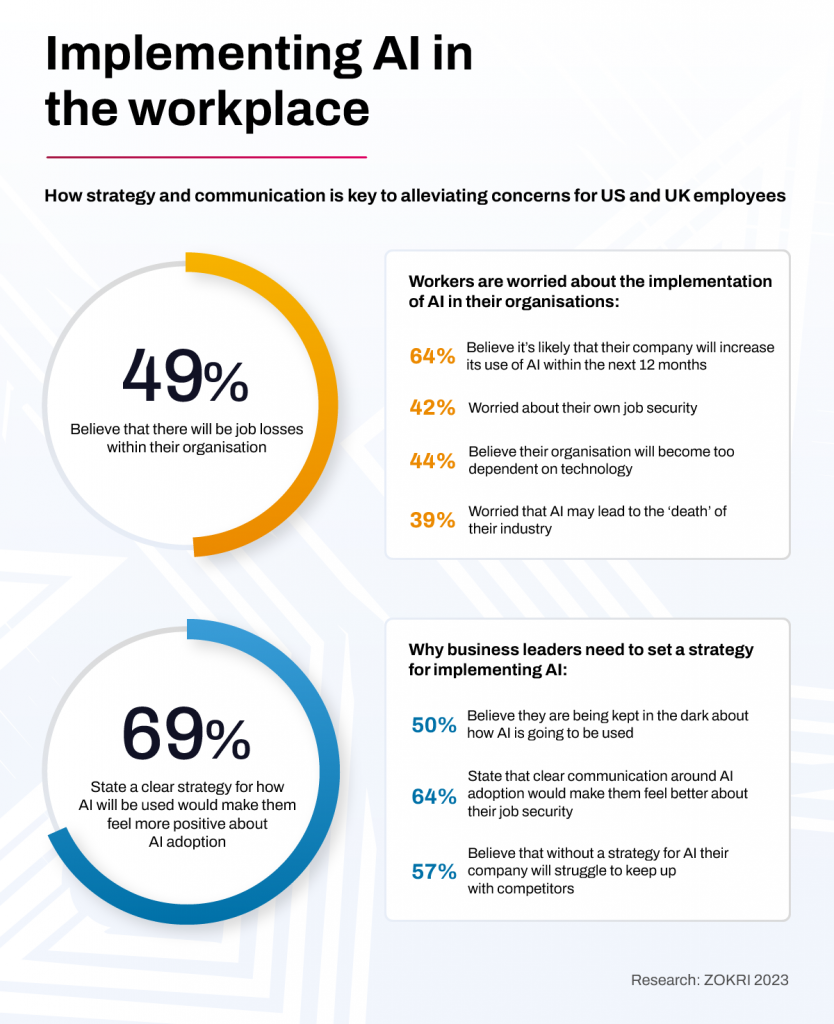Implementing AI – How Strategy and OKRs are Key for Successful Adoption of Artificial Intelligence
This year, we have taken major leaps forward in the development and application of AI technology, with the likes of Chat GPT, Google’s Bard, and Midjourney taking the world by storm. And increasingly, we have begun to witness the potential impact that this technology will have on how we live, work, and operate.
A white-collar workforce industrial revolution
One such arena AI is poised to revolutionise is the white-collar workforce. From drafting copy and writing code, to creating stunning images with a stroke of a keyboard – AI is likely to disrupt the world of work in such a manner comparable to that of the industrial revolution or the introduction of the internet.
With organisations increasingly experimenting with AI, we commissioned research that looked to uncover employee’s attitudes towards AI adoption, reveal how AI is currently used within businesses in the UK and the US, and explore how OKRs can help companies implement AI successfully. Our research revealed:
- 53% of professionals had used AI technology to assist them in their job role within the last 12 months
- 64% said that it is likely that their company will increase its use of AI within the next year.
Top 10 uses of AI according to our research
1. Research (28%)
2. Drafting email copy (25%)
3. Customer service (25%)
4. Summarising large amounts of information (24%)
5. Data analysis (24%)
6. Writing copy (22%)
7. Writing code (22%)
8. Helping to learn a new skill (22%)
9. Creating a presentation (22%)
10. Answering questions from colleagues (22%)
Professionals share concerns about AI adoption
With more employers placing emphasis on automation and the increased usage of AI across the UK and US markets, our study found that many workers are concerned that AI will lead to mass job losses in their industry.
- Almost half (49%) of respondents believe that there will be job losses within their own organisation as a result of AI adoption, with 42% specifically worried about their own job security.
- Two in five (39%) went as far as to state that they were worried that the recent introduction of AI within their sector may lead to the ‘death’ of the industry altogether.
Our study also found that many employees were concerned about the ethical implications of implementing AI within the workforce, with 47% believing that AI has the potential to make their workplace less ethical. The key ethical concerns flagged by respondents were the potential for AI to create problems with ageism (63% of respondents), gender bias (43%), and racial bias (42%).
Alleviating fears with strategy
With many employees concerned about the increasing usage of AI within their organisation, our research found that by setting a clear strategy and communicating this across the wider business, business leaders can help reassure their employees.
- Over two-thirds (69%) of employees stated that a clearly defined strategy for how AI is going to be used within their organisation would make them feel more positive about AI adoption, and 64% agreed that it would make them feel more positive about their own job security.
We also found that a clear strategy for AI adoption could have the potential to lead to more organisational success too.
- Almost two-thirds (65%) agreed that it would make them feel more confident about AI being a success for their business.
- 60% believed that it would lead to better recruitment of talent.
- 57% believed that without a clear strategy for adopting AI their company will struggle to keep up with competitors in the coming years.
How OKRs can help make AI a success for organisations
Using OKRs can not only help employees feel more positive about AI adoption but can also help businesses make AI a success for their organisation.
OKRs can be a valuable tool for organisations looking to adopt AI.
-
What are OKRs?
Not to be confused with KPIs - OKRs (Objective and Key Results) is a framework used to set goals. The OKR acronym uses an Objective to detail what needs to be achieved, and a series of Key Results to describe the measurable outcomes that, when achieved, would result in the objectives’ success. Here are some great examples of OKRs, for more information.
When employees understand how AI is being used to support their work and the broader goals of the organization, they are more likely to embrace it and consider how it can help them increase productivity and efficiency in their own roles.
Additionally, by involving employees in the strategic planning process, organisations can ensure that employees have a voice in how AI is being used and can provide feedback on how it can be optimized to better support their work. When employees feel like their opinions are valued and that AI is being used to support their success, they are far more likely to be enthusiastic about using it in their role.
The OKR framework, supported by OKR training and consulting, can be a powerful tool for ensuring that AI initiatives are consistently aligned with organizational goals, helping to ensure that AI is strategically utilized to deliver real business value. For example, an organization might set an objective to increase efficiency through automation, with key results such as reducing manual processing time by 50% or achieving a 90% accuracy rate on AI-generated reports. By setting these OKRs, the organization can track progress over time and ensure that all AI-based initiatives remain on course to deliver the desired outcomes and value.
Without a well-communicated plan, however, organizations risk wasting resources, missing employee buy-in, and ultimately forfeiting the opportunities AI can offer. Through clear objective-setting and alignment with Key Results (OKRs), businesses can ensure that AI’s strategic implementation is focused, measurable, and fully aligned with overall business strategy and goals.
Check out some of our resources to get more information on OKRs and Strategic Pillars, or using OKRs and KPIs together to execute strategy and improve performance. You might also be interested in the research that supports these business concepts.
The research was conducted by Savanta on behalf of ZOKRI in April 2023. The research surveyed 2,011 office workers – with 1,010 in the US and 1,001 in the UK.
- United Kingdom
Ashtead
KT21 1RZ
+44 20 7046 1328

- United States
New York
NY 10013
+1 646-718-4720
- ZOKRI helps leaders and teams achieve strategic goals using the OKR (Objectives & Key Results) framework. Our platform aligns strategy, goals, and people, fostering engagement and growth through comprehensive training and management systems.
© ZOKRI 2025 All rights reserved | Privacy Policy | Terms & Conditions | GDPR
Contacts Us
Tell us what you need. We'd be delighted to help.
"*" indicates required fields
